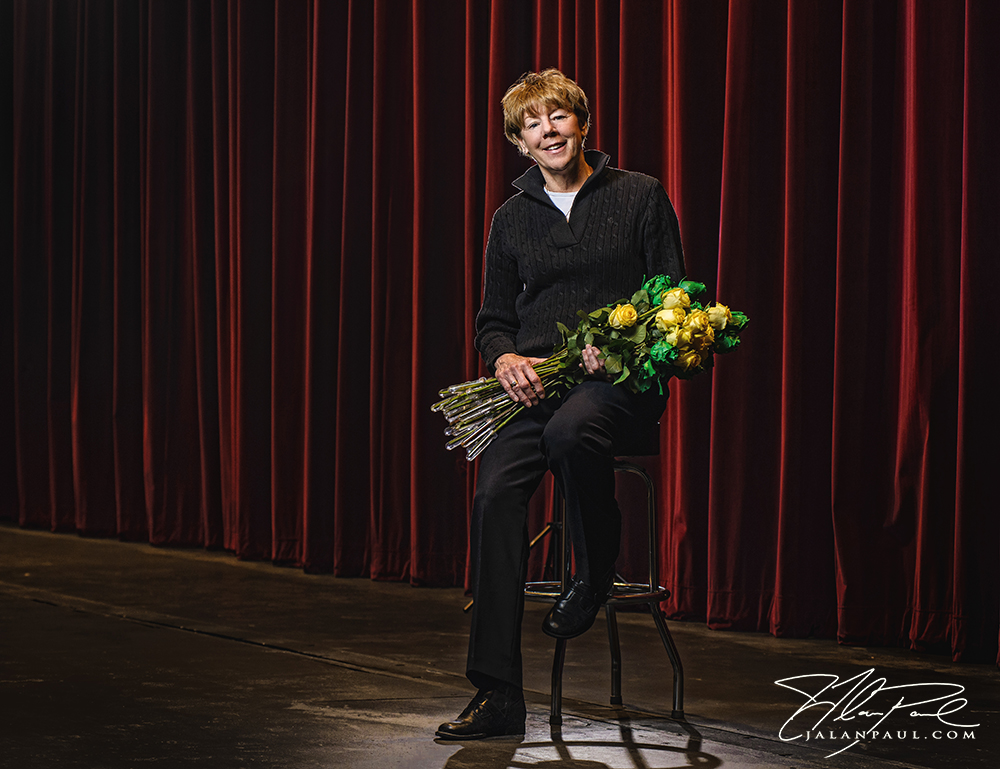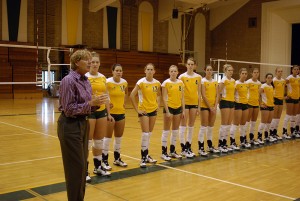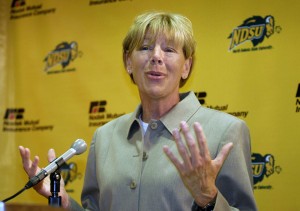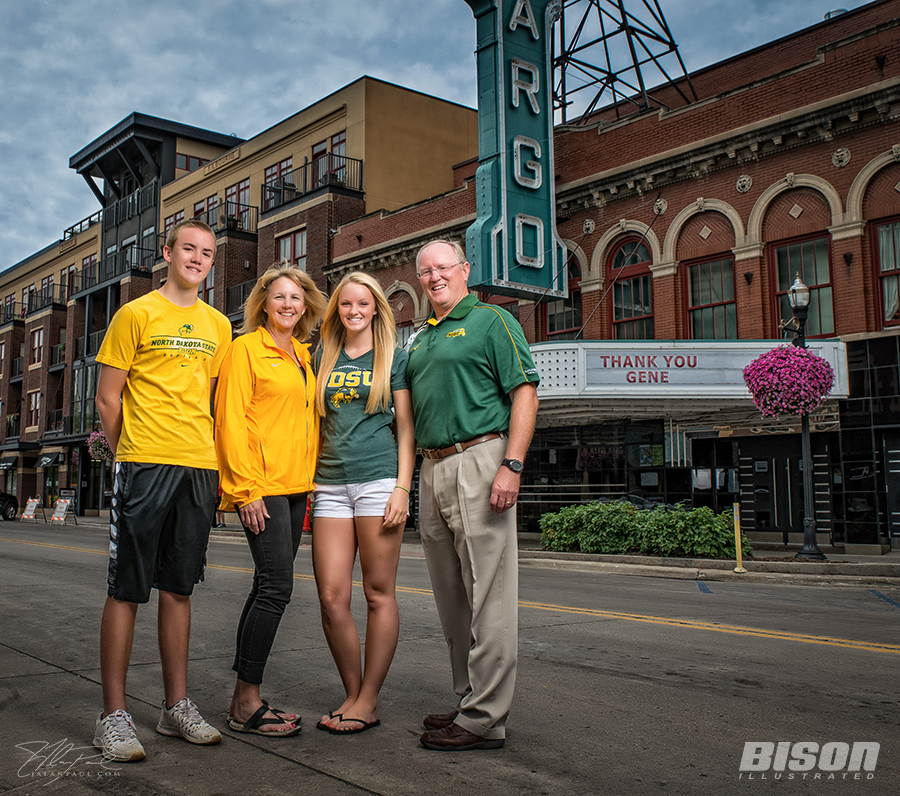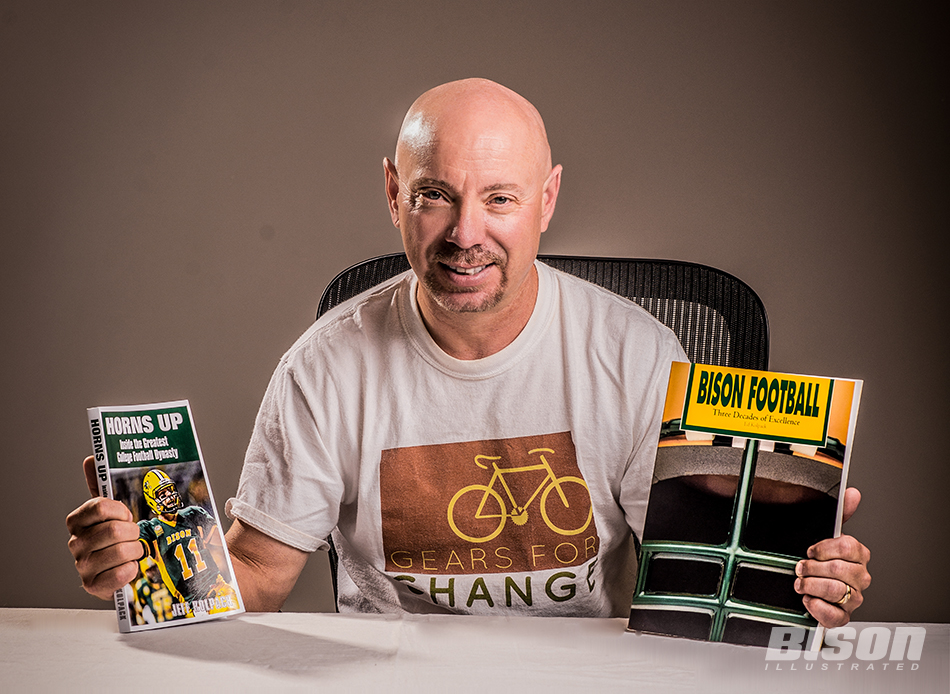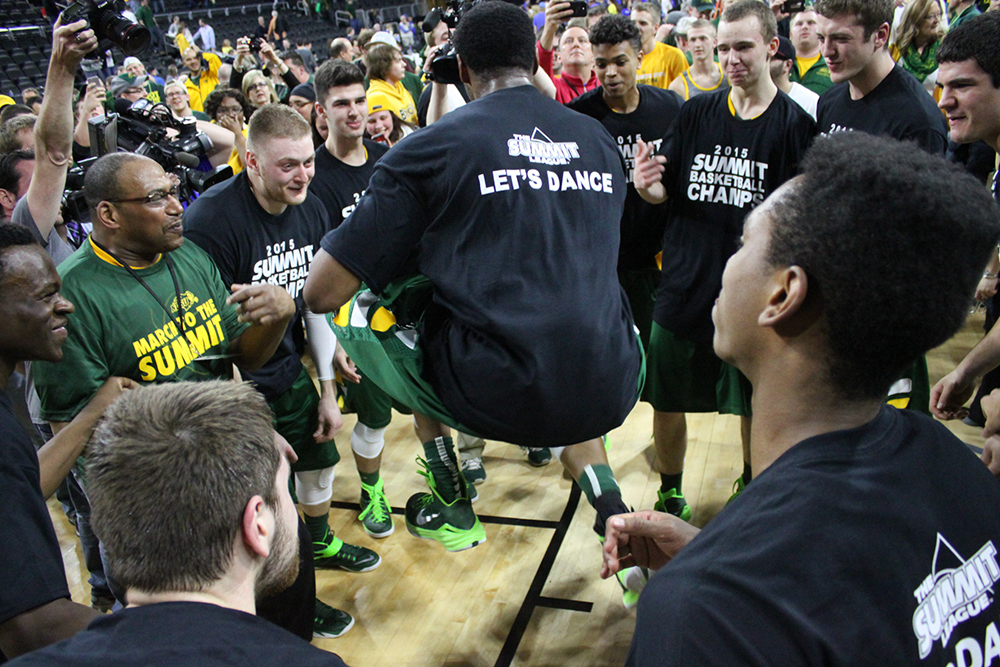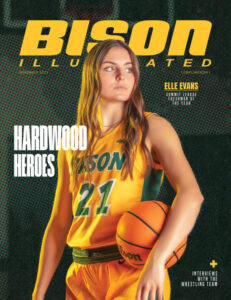The end of March will mark the end of an era at North Dakota State. Women’s Director of Athletics Lynn Dorn will say goodbye to an institution she has been an influential part of over the last 38 years. Representing the plight of women’s athletics has been one of the many undertakings Dorn has endured during her tenure. Through several transitional periods during Bison athletics’ history, Dorn has stood tall as the figurehead for women’s athletics and what’s in the best interest for student-athletes no matter the gender.
INTERVIEW
What was your objective when you arrived at NDSU?
“I think it really was about giving a sense of confidence to the women. They just didn’t perhaps have a sense of expectations quite yet about how good they could be and so to be able to have young women believe they could be good was probably the first objective that we had. We competed against smaller institutions and we could really envision a much higher profile coming from these kids, so it probably was to instill a level of confidence that as a woman in athletics, they could be very successful.”
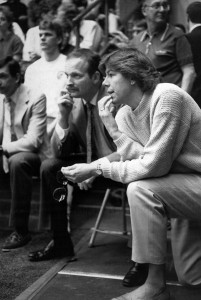
Lynn Dorn and former Bison athletic director Bob Entzion watch a Bison basketball game during the 1990s.
And at this time was the landscape of women’s athletics vastly different than what it is today?
“We were in the AIAW (Association for Intercollegiate Athletics for Women). It wasn’t affiliated with the NCAA. It was a stand-alone organization comprised of women that really valued sport. We were in the Minn-Kota Conference. It was women administrators that had pioneered in many ways opportunities for girls and women in sports. They formalized it, structured it knowing full-well that the men’s organizations – the NAIA being very strong and the NCAA – were a separate organization and that’s who we belonged to as an institution.”
What opportunity led the women to joining the North Central Conference in 1979?
“The North Central Conference was really, again, very much of a visionary conference in that the women’s program really became immersed in the entire philosophy of sport. It was really a point in time where because of the quality of the leadership on the men’s side, led by Dr. Ade Sponberg, director of athletics at NDSU, they really did embrace the women’s program. And I really don’t believe it was because of Title IX. I really believe that they valued opportunities for women in sport. Those of us at NDSU didn’t really feel the plight of not having equity or opportunities for women. We didn’t really understand what would be labeled as discrimination against women that wanted to be in sport. Contrary, our president Laurel D. Loftsgard and our athletic director Dr. Sponberg really welcomed women in sport.”
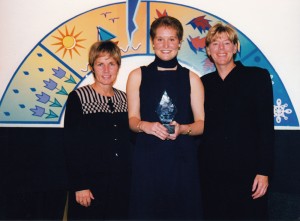
(from left to right) Amy Ruley, Theresa Lang and Lynn Dorn are photographed after Theresa received a national award.
Judy Ray was the women’s athletic director when you arrived and was the tutelage you needed as a young administrator, correct?
“It was really a point in time when I was able to be here, it was perfect timing. They talk about timing, and my opportunity at NDSU was from a movement standpoint to an opportunity to grow, to an opportunity to expand it was really perfect and we were able to reach out to critical people that helped us. We were able to reach out to our male coaches, who were invaluable at the time. (Football) Coach (Don) Morton gave us his recruiting letters. We were all 23-24 years old and we didn’t really have a recruiting model and learning how to do the scholarships. So we spent a lot of time with Don in his office, and he assisted us in the presentations to families and assisted us on how to really promote NDSU. Well, really we were the first generation of administrators that were even giving out scholarships so Coach Morton would be someone who was invaluable as well.”
Some of the pushback to Title IX was that it compromised men’s athletics. How did you avoid that tension?
“What we really realized was that it didn’t do any good to rob Peter to pay Paula. What we did was work very hard and we supported the men and likewise they supported us, and it’s always been a partnership at NDSU and that’s unique. It’s unique in that we’ve been able to blend it. It’s hard to imagine there would be programs that would actually not support the efforts of each other. For us, it was really about wanting to be recognized as a part of NDSU, to be appropriately identified as a Bison. It was very intentional; this didn’t happen by chance. It all happened by design and to be able to create it and be able to move it, took some key people, but again the overall support from central administration at NDSU, to the men’s program to the current day where Matt Larsen is going to be a wonderful athletics administrator who values men and women alike.”
How hard was that transition period from division I to division II even though you’ve built this certain culture and philosophy with the athletic department?
“The true heroes of that transition were the coaches. It was hard for highly competitive and successful coaches like Darren Mueller to go to work every day knowing he wouldn’t have an opportunity to challenge his women for a conference championship or regional play. Every day you try to go to work and it took so much more energy for them to keep the athlete motivated to keep promoting that it’s a good thing to be at NDSU and the value of the experience and what it has done. So I’m indebted to them and I’m indebted to the athletes, the athletes that stayed with us, those first classes that we told the experiences are going to be here at NDSU and they stayed with us and those kids were just tremendous. I think we have a special place in our hearts for those kids that represented us with a lot of pride during that transitional time.”
How do you prioritize the relationships you make with the student-athletes?
“It’s the No. 1 priority. I think that the student athletes are why we go to work every day. To be able to prioritize their needs is critical — a classroom teacher, a professor, a researcher, we all exist because of the students. If you can see the athletes come in young and eager and leave as accomplished and mature men and women that will go out and be difference makers, that’s really incredible. The reward is certainly to watch the victories. The memories are built on national championships, but to watch young people literally walk across a stage that you would anticipate wouldn’t have been able to because of their plight and earn a degree, that’s a big deal. We have women that are doctors, moms, professional businesswomen, we have them all over the place and in large part because they were athletes at NDSU. There are women that got scholarships, there are women that competed that were members of a team. I mean how can you not celebrate a young person’s four or five years at NDSU and hope that the impact that we’ve provided for them are going to make them better citizens?”
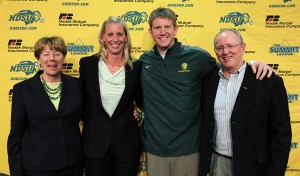
(from left to right) Lynn Dorn, Maren Walseth, Dave Richman and Gene Taylor at the introductory press conference for the new basketball coaches in April 2014. Dorn also had a hand in hiring Amy Ruley and Tim Miles.
What are some of the changes you have witnessed with the program since you came in nearly 40 years ago?
“I think a couple of things. The notion of the business side of sport that really resonates every day and it is a multimillion dollar business and one has to recognize that, and one has to understand that, but that doesn’t mean you have to compromise the fact that it’s still a part of higher education. I think that’s really the mission, that we have to make certain that we keep is that intercollegiate athletics is a component of higher education and the educational mission of a student-athlete experience and I do believe the business is a significant part. The commercialization, the marketing, the branding, all the exposure, the technology right now and how it has changed the face of everything that we do.”
What goes through your head when you think about retiring from an institution you’ve been involved with for 38 years?
“I think what happens is, is you have such an opportunity you can hardly go to sleep at night because you can’t wait to get up and go to work in the morning. It’s a great place to work, and yet, I think that everything has a timeframe and I don’t know how we determine time frames except for an emotional feeling. So I think now it’s an opportunity to make that commitment to my family. There are many sacrifices that many people in athletics give. It’s 24/7. I have a wonderful family, but at the same time, I can tell you that there is plenty that I didn’t share because of my opportunities at NDSU. My father is 87; he’ll be 88 in March and to know that I can go home on weekends and to know that I can still be involved in his life. I have grandnieces and grandnephews and I dare say they’re going to be really good athletes. For me to be a part of the competitions and to go see them grow and hopefully become Bison at NDSU. My niece has a definite calling or definite goal to be a part of the basketball program at NDSU. She said, ‘Lynn, I want to play for the Bison.’ My grandnephew, I think he’s going to be a baseball player for NDSU. They’re 12 years old, but how fun to see that. So that’s part of what I’m going to do, and I think certainly there are work opportunities. I can’t imagine not going to work, whatever that means, whatever work is. (The) work might simply be whatever that day brings. I have an opportunity to teach a class so I’m still on campus two days a week during the spring so that’s where it’s really fun is to get back in the classroom with young and eager people wanting to be professionals in the sports management industry so how fun. It’s a great gig, right?”
We’ve talked so much about the people that have been here and helped you but let’s remember that you’re leaving a legacy here, too. What are people going to remember you by?
“You hope not, you hope that isn’t what it’s all about. You really hope that somewhere in the background you’ve been able to make a difference, that’s what you hope for. To be an athletic administrator with an ego, I learned very early, is counterproductive. There is no room for that. That doesn’t mean that you’re not confident, that doesn’t mean you’re not intense, but it means that as an individual that you’ve never won a game, you’ve never scored a basket (laughs). When you think about it, there are other missions for you to do and that’s just to provide resources and educational opportunities for other people’s success. It’s bigger than an individual; it’s a culture, it’s an environment, they won’t miss a beat and it just flourishes. And it’s not in spite of you, but it is in some ways. It’s tough to define or to quantify, but just think about what a privilege it has been to have a life that I have had at North Dakota State. I’ve been to places, I’ve seen things, I’ve traveled, I’ve watched championships. Just think about it.”
What are you going to miss the most about working at NDSU?
“The people. It’s all about the people. Ade Sponberg years ago said, ‘Lynn, it’s not about brick and mortar; it’s about the people.’ People make programs; that’s what you’re going to miss. You’re going to miss associating with the finest of coaches, the finest of athletic administrators, the finest of the student athletes, all the support staff. It’s really about the community at NDSU and in particular the athletic department that you’re going to miss. And certainly I’ll go to games and I’ll watch competitions but really, it’s the heart and soul of the athletic program which is the people.”
Well Lynn, it’s been one hell of a ride.
“You talk about a full-ride student athlete; I had 38 years of being on a full ride, tuition fees, room and board, plus the cost of attendance. It’s the whole thing. I mean my goodness (laughs). How else could you frame it? So that’s my story.”


